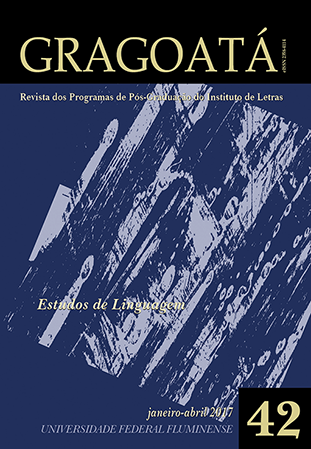Learners’ impressions and pressures in the process of appropriation of Portuguese as a foreign language: proficiency and switching languages on a collision course
DOI:
https://doi.org/10.22409/gragoata.v22i42.33482Keywords:
Didactics of plurilingualism. Code-switching. Linguistic heterogeneity. PFL teaching.Abstract
Researches about linguistic and cultural heterogeneity in foreign language classes have been helping teachers to suit their teaching practices to the special features of plurilingual and pluricultural students. However, in the Portuguese Foreign Language (PFL) context, this phenomenon has been studied especially from a cultural point of view, leaving aside other equally important aspect of this heterogeneity: the linguistic. Our purpose here is to present the first results of an ethnographic research, focused on the plurilingual reality of a PFL class in the Federal University of Pará (UFPA). The data collected by interview (with students) and teaching actions observations were treated in a qualitative way comprising two moments of reflection: the first take is about contextual aspects and about the individuals; the second is focused on the ways that students deal with their repertoire bi(pluri)lingual, mainly concerning to their linguistic representations and their linguistics actions. On the one hand, the first analyzes show that code-switching is an unavoidable trait in bi(pluri)lingual classes (however, it is often seen as a secret practice that, if caught in the act, is reproached by teacher and discouraged by the classmates) and, on the other hand, an educational resource that, properly dealt, is likely to turn more effective the learning of a language (here, PFL). Hence it’s necessary to take into account the linguistic repertoires of these students, using this knowledge in an open and dynamic perspective, leading to the expansion students’ communicative competence in the target language.
---
DOI: http://dx.doi.org/10.22409/gragoata.2017n42a863
Downloads
Downloads
Published
How to Cite
Issue
Section
License
Authors who publish in Gragoatá agree to the following terms:
The authors retain the rights and give the journal the right to the first publication, simultaneously subject to a Creative Commons license CC-BY-NC 4.0, which allows sharing by third parties with due mention to the author and the first publication by Gragoatá.
Authors may enter into additional and separate contractual arrangements for the non-exclusive distribution of the published version of the work (for example, posting it in an institutional repository or publishing it in a book), with recognition of its initial publication in Gragoatá.

Gragoatá is licensed under a Creative Commons - Attribution-NonCommercial 4.0 International.











